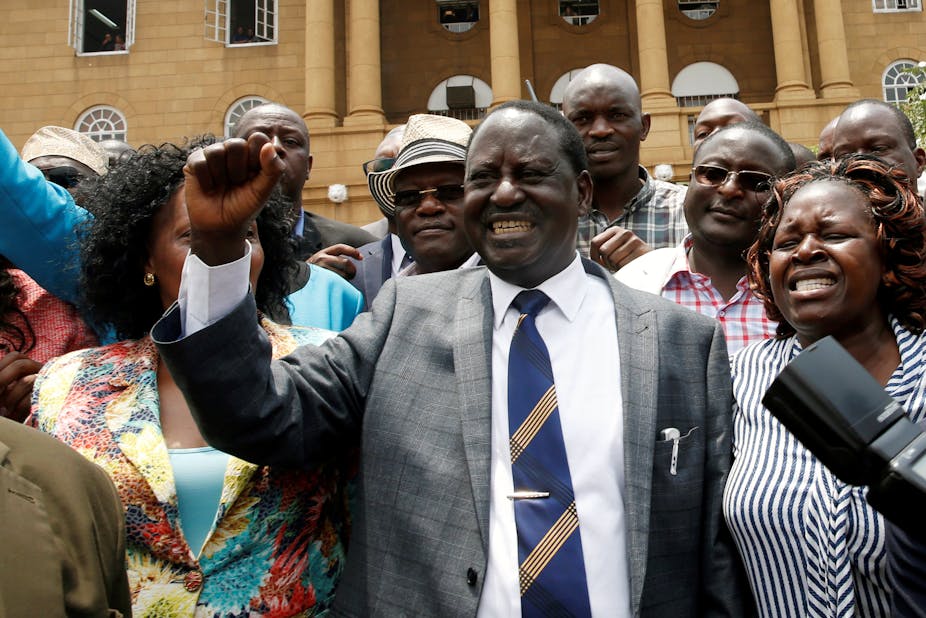Kenya’s Chief Justice David Maraga was widely expected to dismiss the election petition filed by opposition candidate Raila Odinga against President Uhuru Kenyatta and the Independent Electoral and Boundaries Commission.
Odinga filed the petition at the Supreme Court on August 18 on claims that the August 8 election had been rigged. Two weeks later the court surprised the world by invalidating the presidential election.
Justice Maraga declared that,
The greatness of any nation lies in its fidelity to the constitution, adherence to the rule of law and above all respect to God.
The Supreme Court made a brave decision not to uphold the status quo. But the historic ruling is also evidence of the strides Kenya’s judiciary has made in rebuilding itself after the Daniel Moi era when justice was sold to the highest bidder.
So this decision is important not just for the rule of law but also for the nurturing of Kenya’s nascent democracy. The Supreme Court becomes only the fourth country in the world to nullify presidential elections after Ukraine, the Maldives, and Austria.
Election in context
The Supreme Court judges who ruled to annul the elections withstood the pressure to move on from the poll and allow the country to return to normalcy. Four judges ruled for the annulment and two ruled to dismiss the petition.
The annulling judges went against the dominant “peace narrative” which has been advanced by Kenyatta and his Jubilee Party since the contested 2013 election. That election was also contested with opposition candidate Raila Odinga filing a petition to challenge Kenyatta’s win.
But the petition was dismissed and the “peace brigade” swung into full force urging Kenyans to forget the past and move on. Conversations about justice or the accountability of government were discouraged. Kenyatta and his running mate William Ruto privileged peace over justice. Anyone demanding justice was considered anti-peace and anti-development.
The two were sworn in despite facing charges before the International Criminal Court for their role in Kenya’s 2007 post-election violence. During that conflict more than 1,000 people died and about 600,000 were displaced. Kenyatta and Ruto quickly launched a legal and diplomatic offensive to exonerate themselves and by early 2016 all the charges against them were dismissed.
Many felt that they had escaped justice. This especially because many of the victims of that conflict are still waiting for reparations.
By invalidating the incumbent’s election the Supreme Court has challenged the idea that peace can be attained without justice. In its strict adherence to the law the court has shown that both peace and justice are necessary to address impunity in Kenya.
The Raila/Uhuru question
The judges also validated Odinga’s role in Kenya’s democracy. Odinga is both loved and loathed for his immovable stance against electoral malpractice. Before the court invalidated the 2017 election he was roundly ridiculed for being a sore loser. Sections of the international media have since reassessed their critical positions.
That said, analysts have unfairly reduced the election to a duel between the Odinga and Kenyatta dynasties.
In truth the duel is a contest between Odinga’s progressive socioeconomic ideals, and Kenyatta’s conservative ideals which are structured to protect Kenya’s economic elite.
According to XN Iraki, a senior economics lecturer at the University of Nairobi, Raila’s efforts to confront the excesses of capitalism are fought hardest by ethnic nationalists and international corporations keen to preserve their economic power and privilege.
Tale of an election gone wrong
The Supreme Court has put to shame indications from foreign observers and the international media that suggested the election was free and fair. The quick endorsements from chief observer, former American Secretary of State John Kerry, glossed over irregularities in the election process.
While the voting process proceeded without incident the court found the transmission of results to be faulty. It ruled that the election commission committed “irregularities and illegalities” in the transmission of results confirming some of the concerns raised by Odinga in his petition against the IEBC and Kenyatta. The absence of security features on some election materials also raised concerns about their validity.
This conclusion was reached in part after IEBC defied court orders by denying investigators full access to its electronic transmission kits and servers on the grounds that the security of the commission would be compromised.
In addition, the circumstances around the murder and torture of IEBC’s head of information technology, Chris Msando, just before the election cast a dark shadow over the commission’s below average electronic performance. While the reasons for Msando’s killing are still unknown his death might have been a factor in the court’s poll decision.
Protecting democratic gains
Plans to implement the supreme court ruling through a fresh presidential election on October 17 are underway. Odinga has demanded greater guarantees for a free and fair election such as the replacement of commissioners and key IEBC managers.
IEBC chair Wafula Chebukati has resisted calls for his resignation promising instead to reform the elections body and ensure that credible elections are held in October.
From now on Kenyans must be vigilant and robust in their defence of the courts. More so after Kenyatta threatened to “fix” the judiciary should he win the fresh election.
As the country goes into another charged campaign period it is hoped that both Kenyatta and Odinga compete with mutual respect. Also, that their supporters keep the peace and the police refrain from confronting civilians with excessive force.

